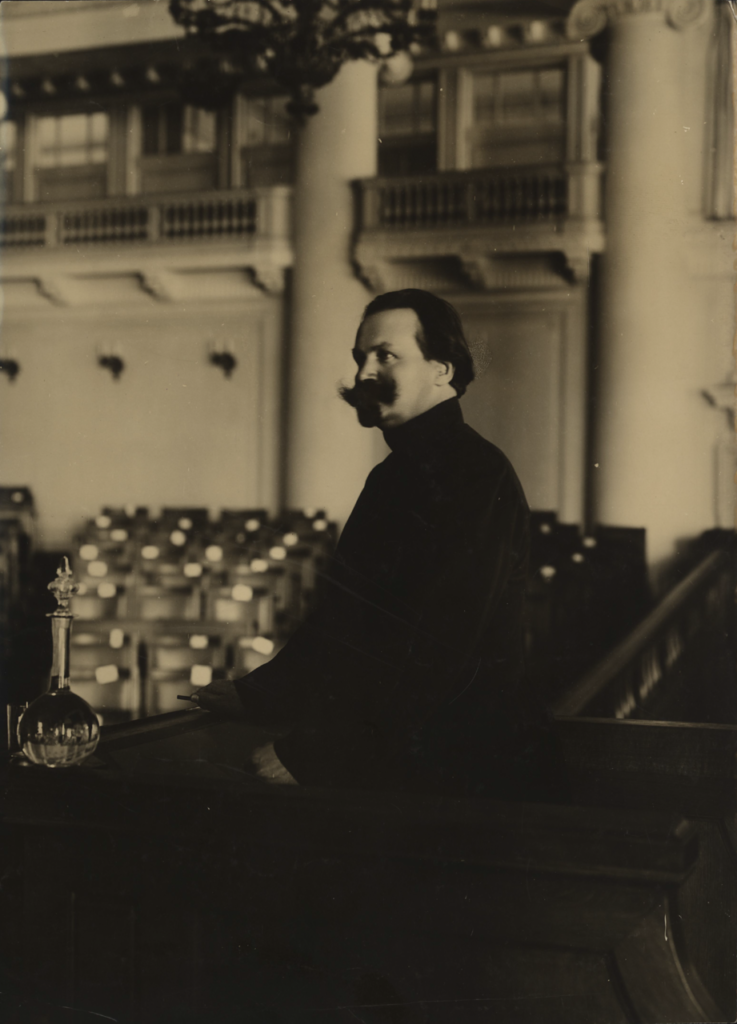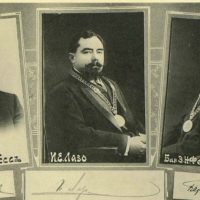
Related

Deputies of the Third State Duma.

Deputies of the Third State Duma.

Deputies of the Third State Duma.

Deputies of the Third State Duma.

Deputies of the Third State Duma.

Deputies of the Third State Duma.

Deputies of the Third State Duma.

Deputies of the Third State Duma.

Deputies of the Third State Duma.
Chelyshov, Mikhail Dmitrievich, Member of the III State Duma, makes a speech against drunkenness.
Summary
Deputies of the State Duma of the Russian Empire.
Chelyshov, Mikhail Dmitrievich, Member of the III State Duma, makes a speech against drunkenness.
He was born into a peasant family. Received a home education. He was a painter, worked as a contractor in the painting business, got rich, became a merchant, the owner of commercial establishments and baths. From 1892 until his death, he was the head of the Samara City Duma.
In 1907 he participated in the work of the Second Congress of the Union "October 17" and was elected a member of the III State Duma from the Samara province. He was known as a decisive opponent of the consumption of alcoholic beverages and distillation, spoke on this topic in the State Duma with vivid speeches, was a member of the Duma anti-alcohol commission. He was an honorary member of the Kazan Temperance Society.
Депутаты Государственной Думы Российской Империи. Челышов, Михаил Дмитриевич, Член III Государственной Думы, произносит речь против пьянства.
Родился в крестьянской семье. Получил домашнее образование. Был маляром, работал подрядчиком по малярному делу, разбогател, стал купцом. Владелец торговых заведений и бань. С 1892 и до своей кончины был главным Самарской городской думы.
В 1907 участвовал в работе II съезда партии «Союз 17 октября». Был избран членом III Государственной думы от Самарской губернии. Был известен как решительный противник потребления спиртных напитков и винокурения, выступал на эту тему в Государственной думе с яркими речами, входил в состав думской противоалкогольной комиссии. Являлся почётным членом «Казанского Общества Трезвости».
Vsesoslovnoe representation in was established by the Manifesto on the establishment of the State Duma and the law on the creation of the State Duma, published August 6, 1905. Nicholas II under the pressure of Premier S.Witthe writes: "Now it is time, following the good endeavors of them, to call elected people from the whole of the Russian land to a permanent and active participation in the drafting of laws, including for this purpose a special law-setting institution in the composition of higher state institutions, which is provided with the preliminary development and discussion of legislative proposals and consideration of the mural of state revenues and expenditures. " For the first time the Duma was convened in 1906 and existed for 12 years and 4 convocations (first, second, third, fourth State Duma). The number of Duma deputies varied from 480 to 525 people at different times. On April 23, 1906, Nicholas II approved a set of laws that the Duma could change only on the initiative of the Tsar himself. The executive power was subordinate only to the tsar. The First Duma lasted from April to July 1906. There was one session. Elections to the Duma were determined in the law on elections, issued in December 1905. According to him, four electoral curiae were established: landowners, city, peasants and workers. According to the workers' curia, only those proletarians who were employed in enterprises employing no less than 50 were allowed to vote. Elections were not universal (women, youth under 25, servicemen, and a number of national minorities were excluded), not equal (one elector was in the landowning curia for 2 thousand voters, in the urban - 4 thousand, in the rural - 30, for 90 thousand), not direct - two-stage, but for workers and peasants three - and four-degree. The largest fraction was the Cadets - 179 deputies. The Octobrists - 16 deputies, the Social Democrats - 18. From the so-called national minorities there were 63 representatives, non-partisans - 105. The fraction of the agrarian labor party of Russia, the Trudoviks, counted 97 deputies. Всесословное представительство в России было учреждено Манифестом об учреждении Государственной Думы и законом о создании Государственной Думы, изданными 6 августа 1905 года. Николай II под давлением премьера С.Ю.Витте пишет: "Ныне настало время, следуя благим начинаниям их, призвать выборных людей от всей земли Русской к постоянному и деятельному участию в составлении законов, включив для сего в состав высших государственных учреждений особое законосовещательное установление, коему предоставляется предварительная разработка и обсуждение законодательных предложений и рассмотрение росписи государственных доходов и расходов". В первый раз Дума была созвана в 1906 году и просуществовала 12 лет и 4 созыва (первая, вторая, третья, четвертая Государственные Думы). Число депутатов Думы в разное время колебалось от 480 до 525 человек. 23 апреля 1906 года Николай II утвердил свод законов, который Дума могла изменить только по инициативе самого царя. Исполнительная власть подчинялась только царю. Первая Дума просуществовала с апреля по июль 1906 года. Состоялась одна сессия. Выборы в Думу определялись в законе о выборах, изданном в декабре 1905 года. Согласно ему учреждались четыре избирательные курии: землевладельческая, городская, крестьянская и рабочая. По рабочей курии к выборам допускались лишь те пролетарии, которые были заняты на предприятиях с числом работающих не менее 50. Выборы были не всеобщими (исключались женщины, молодежь до 25 лет, военнослужащие, ряд национальных меньшинств), не равными (один выборщик приходился в землевладельческой курии на 2 тысячи избирателей, в городской - на 4 тысячи, в крестьянской - на 30, в рабочей - на 90 тысяч), не прямыми - двухстепенными, а для рабочих и крестьян трех - и четырехстепенными. Самой многочисленной фракцией были кадеты - 179 депутатов . Октябристы - 16 депутатов, социал-демократы - 18. От так называемых нацменьшинств было 63 представителя, беспартийных - 105. Фракция аграрной трудовой партии России, "трудовиков", насчитывала 97 депутатов.
